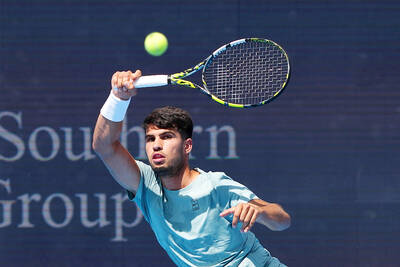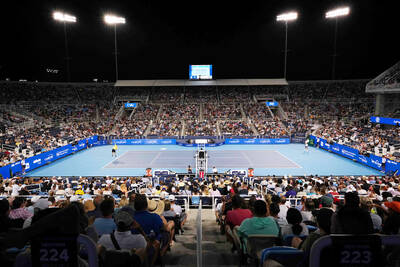Even after resolving a long-simmering dispute about an under-16 gymnast that put another Olympic medal in their column, leaders in the US program remain dissatisfied with the way the sport’s international body handles a number of age-related issues.
During a series of interviews last week at US nationals, leaders voiced concern about three issues: the handling of the Youth Olympics; a new rule that makes it more difficult for female gymnasts who are turning 16 in the Olympic year to get international experience beforehand; and the 16-year-old age limit itself.
“I’d like the FIG [International Gymnastics Federation] to look at the preparation of the child and let the country decide who is best to compete,” women’s national coordinator Martha Karolyi said.
Since 1997, international rules have said a girl must turn 16 in the calendar year of a senior event to compete in it.
Karolyi and her husband, Bela, have long believed in scrapping age limits for senior events, saying that, among other things, they create an uneven playing field between countries that adhere to the rules and those that try to skirt them.
“I don’t want to go into all that, but we respect the rules and some countries don’t,” Karolyi said. “It just came out. We just found out the Chinese didn’t respect that.”
Questions about the age of Chinese athletes resulted in investigations, one of which led to the disqualification from the 2000 Olympics of a gymnast who was found to be underage. China’s team bronze medal was reissued to the US team that finished fourth in Sydney. The US gymnasts received the medals at a ceremony at US championships last week.
Another investigation about the age of the Chinese at the Beijing Games didn’t lead to sanctions.
The 2000 bronze medal marked the 50th won by USA Gymnastics in major international competition since 2000. Though the US fares well under the current system, the country’s leaders remain largely at odds with key rules involving international age.
For instance, it has long been a rule that girls must turn 16 in the year of the Olympics to compete in the games, but for those girls to gain some experience, a loophole was created to allow them to compete at world championships the year before. Starting in this Olympic cycle, however, the FIG eliminated that loophole.
“A fundamentally bad decision,” USA Gymnastics president Steve Penny said.
Had the loophole not been there during the last Olympic cycle, Shawn Johnson wouldn’t have been able to compete at 2007 worlds, where she won the all-around championship. Johnson, who turned 16 in 2008, went on to take silver in the Olympic all-around, along with gold on balance beam.
This Olympic cycle, the rule figures to affect Kyla Ross, who won her second straight US junior title last weekend. Ross will turn 16 in 2012. She won’t be able to compete at world championships next year.
“It’s not in the best interest of the athlete to expect they’re going to the Olympic Games, possibly for the first time on the international stage, and they have to have their best event there,” Penny said. “And if they don’t, they have to wait another four years. That’s not right.”
Meanwhile, Ross has competed internationally in junior events and “she’ll continue to get international experience,” Karolyi said.

Carlos Alcaraz on Sunday fought through a second-set slump to post a roller-coaster 6-1, 2-6, 6-3 victory over Damir Dzumhur in his opening match at the Cincinnati Open. The Spaniard, playing his first tournament since losing to Jannik Sinner in the Wimbledon final, raced through the first set, but completely lost his way in the second, dropping his serve twice against the 33-year-old Bosnian. Alcaraz regained his intensity and cut down his errors in the third set as a seventh ace took him to a match point that was converted when Dzumhur fired wide. “It was just a roller coaster,” said the second

NEXT ROUND: World No. 1s Jannik Sinner and Aryna Sabalenka opened their title defenses with straight-sets wins, while Iga Swiatek and Taylor Fritz also advanced Jannik Sinner and Aryna Sabalenka got their title defenses off to smooth starts as they powered into the third round of the ATP-WTA Cincinnati Open on Saturday. The men’s and women’s top seeds, each ranked No. 1 in the world, were both competing for the first time since Wimbledon, where Sinner lifted the title and Sabalenka bowed out in the women’s semi-finals. Sinner crushed Colombian Daniel Elahi Galan 6-1, 6-1 in steamy afternoon weather, while Sabalenka beat 2023 Wimbledon champion Marketa Vondrousova 7-5, 6-1 under the lights of the night session. Sabalenka needed 54 minutes and a service break in the final game

Taiwan’s men’s basketball team on Monday clinched a spot in the FIBA Asia Cup quarter-finals with a 78-64 win over Jordan in Saudi Arabia, securing their best finish in the tournament since placing fourth in 2013. The win was sweet revenge for Taiwan, who were denied a quarter-final spot by Jordan at the same stage of the previous Asia Cup in 2022 after blowing a nine-point lead in the final minute and losing 97-96 on a half-court buzzer-beater. “History is part of the journey,” Taiwan head coach Gianluca Tucci said when asked about the 2022 collapse of the team, who he did

TECH ISSUES: Before Sinner’s match against Diallo the lights went out at the courts, and during it the electronic line-calling system partly failed and an alarm sounded Jannik Sinner on Monday ignored technical issues interruptions and a blaring alarm to defeat Gabriel Diallo 6-2, 7-6 (8/6) on a day of distractions at the Cincinnati Open. The top-seeded defending champion got down to business against the 35th-ranked Canadian, who was plagued by eight first-set double faults and 49 unforced errors in the match as he faced the best in the world. Sinner recovered smoothly from an early break down and had his hands full on his way into the fourth round, sending over an ace on match point after saving a set point in the tiebreaker. Play was stopped briefly with